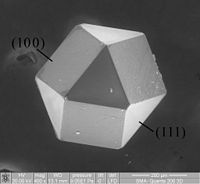
Photo from wikipedia
Environmental and health concerns force the search for sustainable super engineering plastics (SEPs) that utilise bio-derived cyclic monomers, e.g. isosorbide instead of restricted petrochemicals. However, previously reported bio-derived thermosets or… Click to show full abstract
Environmental and health concerns force the search for sustainable super engineering plastics (SEPs) that utilise bio-derived cyclic monomers, e.g. isosorbide instead of restricted petrochemicals. However, previously reported bio-derived thermosets or thermoplastics rarely offer thermal/mechanical properties, scalability, or recycling that match those of petrochemical SEPs. Here we use a phase transfer catalyst to synthesise an isosorbide-based polymer with a high molecular weight >100 kg mol−1, which is reproducible at a 1-kg-scale production. It is transparent and solvent/melt-processible for recycling, with a glass transition temperature of 212 °C, a tensile strength of 78 MPa, and a thermal expansion coefficient of 23.8 ppm K−1. Such a performance combination has not been reported before for bio-based thermoplastics, petrochemical SEPs, or thermosets. Interestingly, quantum chemical simulations show the alicyclic bicyclic ring structure of isosorbide imposes stronger geometric restraint to polymer chain than the aromatic group of bisphenol-A.Super engineering plastics that utilise bio-derived cyclic monomers rarely offer the same thermal/mechanical properties, scalability and recyclability as petrochemical derived plastics. Here the authors use a phase transfer catalyst to synthesise a transparent, recyclable and tough isosorbide-based polymer with a high molecular weight.
Journal Title: Nature Communications
Year Published: 2019
Link to full text (if available)
Share on Social Media: Sign Up to like & get
recommendations!